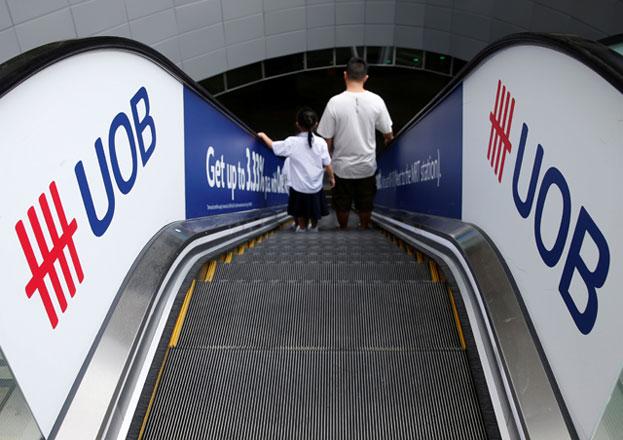You are here
Singapore bank halts London mortgage loans after Brexit as Asia lenders flag risks
By Reuters - Jul 01,2016 - Last updated at Jul 01,2016

A man and his daughter passes United Overseas Bank signage at a mall in Singapore May 11, 2016 (Reuters photo)
SINGAPORE/HONG KONG — United Overseas Bank (UOB) became Singapore’s first lender to temporarily halt mortgage loans for London properties, as other Asian banks flagged potential investment risks in the wake of Britain’s vote to leave the European Union.
Brexit has spooked global markets and pushed the pound to multi-year lows, sparking worries about the health of a London property market that has previously attracted huge interest from Asian investors seeking stable returns.
“We will temporarily stop receiving foreign property loan applications for London properties,” a spokeswoman for Singapore’s No. 3 lender said in an e-mail. “Given the uncertainties, we need to ensure our customers are cautious with their London property investments”.
While UOB’s move is a first, volatility and uncertainty since the June 23 vote about Britain’s economic prospects has encouraged many Asian banks to flag potential risks of London property dealings to customers. The Singaporean dollar has gained 10 per cent against the pound since the referendum, eroding the value of assets held in Britain.
A raft of Asia’s lenders said on Thursday they were issuing reminders to clients of the risks, though they were still offering loans for London properties.
Singapore’s top two lenders — DBS Group Holdings Ltd. and Oversea-Chinese Banking Corp — said London mortgage loans were still available, as did Malaysian lender CIMB and Hong Kong’s Bank of East Asia .
“For customers interested in buying properties in London, we would advise them to assess the situation carefully before committing to their purchases as there could be potential foreign exchange and sovereign risks,” Tok Geok Peng, the executive director of secured lending, consumer banking group at DBS Bank said in an email.
OCBC, meanwhile, said it was monitoring the situation carefully.
At Bank of East Asia, deputy chief executive officer Brian Li told Reuters, “We will continue to provide mortgage loans to our clients, though we are warning our customers of the increased risks arising due to volatility in financial markets.”
“We have a reasonable exposure to London property market, but we believe the risks are manageable at this stage,” Li said.
Negative outlook
JLL, a global real estate consultancy, said there were 1.3 million residential transactions in 2015 in London. In a typical year, overseas investors in London make up about 15 per cent of new transactions, a percentage that rises to up to 40 per cent in central zones of the British capital.
“Singapore is one of the most important markets for London residential property,” said Adam Challis, the head of Residential Research, JLL UK. It did not provide a breakdown of transactions by Singaporean buyers.
Other risks for Singaporean banks have been exacerbated in recent months by an economic slowdown in Asia and rising bad debts in energy-related industries.
Moody’s Investors Service on Thursday revised the outlook on Singapore’s banks to negative from stable. This reflected the “weaker operating conditions” against the backdrop of softer regional economic and trade growth, Moody’s Vice President and Senior Credit Officer Eugene Tarzimanov said.
Property consultants say data on the number of properties purchased by Singaporeans in Britain is not tracked that closely. Banks do not disclose lending data for British property purchases.
Analysts said Brexit could slow the sale of British properties in Asia as buyers turned cautious.
“There have been London properties available for the last few months before the Brexit. The question is whether these properties can still continue to receive buyers in the short-term,” said Alice Tan, the head of consultancy and research at Knight Frank Singapore.
UOB, which runs an international property loans programme that also covers properties in Australia, Japan, Thailand, Malaysia and Singapore, said it would review the market regularly to determine when it could resume its property loan offering.
Related Articles
SINGAPORE — Singapore is opening up its banking industry to digital lenders in a reform that could shake up the sector across southeast Asia
HONG KONG — The Hong Kong Monetary Authority (HKMA) fined the local arm of Singapore's DBS Bank HK$10 million ($1.3 million) for breaches of
SINGAPORE — Vacancies at Singapore's gleaming office towers are nearing their highest level in almost a decade, with construction of the cit


















